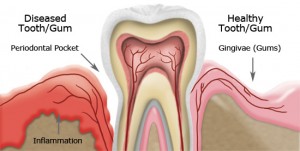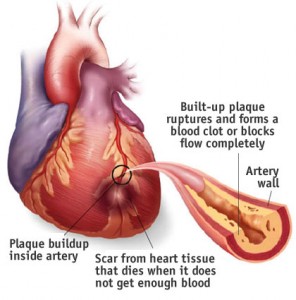
Brushing teeth. Credit: Richmond Smile Centre, (http://www.richmondsmilecenter.com/blog/2012/09/13/your-richmond-dentist-discusses-bad-brushing-habits/)
How often do you brush your teeth thoroughly and floss? Do you pay enough attention to oral hygiene? If you don’t, you might want to consider taking oral hygiene more seriously because research has found that bad oral hygiene could potentially lead to detrimental diseases.

Gum Disease. Credit: St. Lawrence Dentistry (http://www.stlawrencedentistry.com/periodontal-disease-linked-to-other-diseases/)
We know that the oral cavity is one of the places of your body that harbors the most bacteria. These bacteria often do not cause any significant harm to our body, given that we brush our teeth and floss regularly to get rid of these bacteria in our mouth. But when we do not clean our teeth regularly and thoroughly, these bacteria easily build up around our teeth and often cause inflammation of the gums. And in cases when the individuals who suffer from periodontal disease are not taking actions to improve their practice of oral hygiene, infections exacerbate and results in chronic conditions.
Usually, when we think of heart disease, we tend to associate it with obesity, hypertension, smoking, congenital conditions, and other genetic-related problems. But now we might want to add oral problems to our list of factors that contribute to cardiovascular disease. According to numerous studies, chronic bacterial infections in the gums from poor oral hygiene and serious periodontal disease increase an individual’s chance of developing heart attack and stroke.

Plaque in heart artery. Credit: Rudy Pospisil (http://blogs.theprovince.com/2012/03/22/heart-attack-warning-test/)
If you have poor oral hygiene practice, it is likely that you will often accidentally scrape or damage the epithelial oral tissue in the mouth, especially the gums. When the oral tissue is damaged, pathogens can easily enter into the tissues and eventually penetrate into the bloodstream, which then carries these pathogens to other parts of the body, affecting other tissues and body systems and causing multiple inflammations in the body. For instance, a 2005 study conducted by the University of Florida even found oral bacteria inside artery plaque.
Other than heart attack and stroke, the myriads of oral bacteria may also play a role in knee arthritis. In a 2012 study which sought to examine the link between oral bacteria and knee osteoarthritis, the researchers found that out of the 36 patients with knee arthritis, five of them had gum microbes in the synovial fluid in their joints. Although the association between oral bacteria and knee arthritis is still not fully understood, these bacterial certainly worsens arthritis.
Therefore, it is important to brush your teeth regularly and thoroughly since oral hygiene is related to the health of the rest of your body. However, this is not to say that bad oral health has a direct impact on heart disease, since there are other confounding factors such as smoking and type of lifestyle.
– By Connie (Kangchi Lee)
Reference:
How Oral Hygiene Affects the Rest of You
Periodontal Disease Linked to Other Disease?




